| کد مقاله | کد نشریه | سال انتشار | مقاله انگلیسی | نسخه تمام متن |
|---|---|---|---|---|
| 6689717 | 501891 | 2014 | 8 صفحه PDF | دانلود رایگان |
عنوان انگلیسی مقاله ISI
The hourly life cycle carbon footprint of electricity generation in Belgium, bringing a temporal resolution in life cycle assessment
ترجمه فارسی عنوان
چرخه زندگی ساعتی کربن ردیابی تولید برق در بلژیک، آوردن قطعنامه زمانی در ارزیابی چرخه زندگی است
دانلود مقاله + سفارش ترجمه
دانلود مقاله ISI انگلیسی
رایگان برای ایرانیان
کلمات کلیدی
محیط، ارزیابی چرخه حیات، رد پای کربن، برق، تغییر آب و هوا،
موضوعات مرتبط
مهندسی و علوم پایه
مهندسی انرژی
مهندسی انرژی و فناوری های برق
چکیده انگلیسی
In the booming research on the environmental footprint of, for example, electrical vehicles, heat pumps and other (smart) electricity consuming appliances, there is a clear need to know the hourly CO2 content of one kWÂ h of electricity. Since the CO2 footprint of electricity can vary every hour; the footprint of for example an electric vehicle is influenced by the time when the vehicle is charged. With the availability of the hourly CO2 content of one kWÂ h, a decision support tool is provided to fully exploit the advantages of a future smart grid. In this paper, the GWP (Global Warming Potential) per kWÂ h for each hour of the year is calculated for Belgium using a Life Cycle Assessment (LCA) approach. This enables evaluating the influence of the electricity demand on the greenhouse gas emissions. Because of the LCA approach, the CO2 equivalent content does not only reflect activities related to the production of the electricity within a power plant, but includes carbon emissions related to the building of the infrastructure and the fuel supply chain. The considered feedstocks are nuclear combustible, oil, coal, natural gas, biowaste, blast furnace gas, and wood. Furthermore, renewable electricity production technologies like photovoltaic cells, hydro installations and wind turbines are covered by the research. The production of the wind turbines and solar panels is more carbon intensive (expressed per generated kWÂ h of electricity) than the production of other conventional power plants, due to the lower electricity output. The overall average GWP per kWÂ h is 0.184Â kg CO2eq/kWÂ h. Throughout the 2011 this value ranges from a minimum of 0.102Â kg CO2eq/kWÂ h to a maximum of 0.262Â kg CO2eq/kWÂ h depending on the timing.
ناشر
Database: Elsevier - ScienceDirect (ساینس دایرکت)
Journal: Applied Energy - Volume 134, 1 December 2014, Pages 469-476
Journal: Applied Energy - Volume 134, 1 December 2014, Pages 469-476
نویسندگان
Maarten Messagie, Jan Mertens, Luis Oliveira, Surendraprabu Rangaraju, Javier Sanfelix, Thierry Coosemans, Joeri Van Mierlo, Cathy Macharis,
